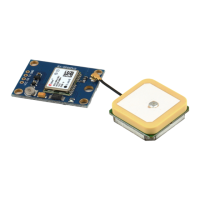LEA-6 / NEO-6 - Hardware Integration Manual
GPS.G6-HW-09007-A Preliminary Product handling
Page 38 of 62
3 Product handling
3.1 Packaging, shipping, storage and moisture preconditioning
For information pertaining to reels and tapes, Moisture Sensitivity levels (MSD), shipment and storage
information, as well as drying for preconditioning see the data sheet of the specific u-blox 6 GPS module.
3.2 Soldering
3.2.1 Soldering paste
Use of "No Clean" soldering paste is strongly recommended, as it does not require cleaning after the soldering
process has taken place. The paste listed in the example below meets these criteria.
Soldering Paste: OM338 SAC405 / Nr.143714(Cookson Electronics)
Alloy specification: Sn 95.5/ Ag 3.9/ Cu 0.6 (95.5% Tin/ 0.6 % Silver/ 0.6% Copper)
95.5%Sn/4.0%Ag/0.5%Cu (95.5% Tin/ 4.0 % Silver/ 0.5% Copper)
Melting Temperature: 217°C
Stencil Thickness: 150 µm for base boards
The final choice of the soldering paste depends on the approved manufacturing procedures.
The paste-mask geometry for applying soldering paste should meet the recommendations in section 2.4.1.
The quality of the solder joints on the connectors (’half vias’) should meet the appropriate IPC
specification.
3.2.2 Reflow soldering
A convection type-soldering oven is strongly recommended over the infrared type radiation oven.
Convection heated ovens allow precise control of the temperature and all parts will be heated up evenly,
regardless of material properties, thickness of components and surface color.
Consider the "IPC-7530 Guidelines for temperature profiling for mass soldering (reflow and wave) processes,
published 2001".
Preheat phase
Initial heating of component leads and balls. Residual humidity will be dried out. Please note that this preheat
phase will not replace prior baking procedures.
• Temperature rise rate: max.3°C/s If the temperature rise is too rapid in the preheat phase it may cause
excessive slumping.
• Time: 60 – 120 seconds If the preheat is insufficient, rather large solder balls tend to be
generated. Conversely, if performed excessively, fine balls and large
balls will be generated in clusters.
• End Temperature: 150 - 200°C If the temperature is too low, non-melting tends to be caused in
areas containing large heat capacity.

